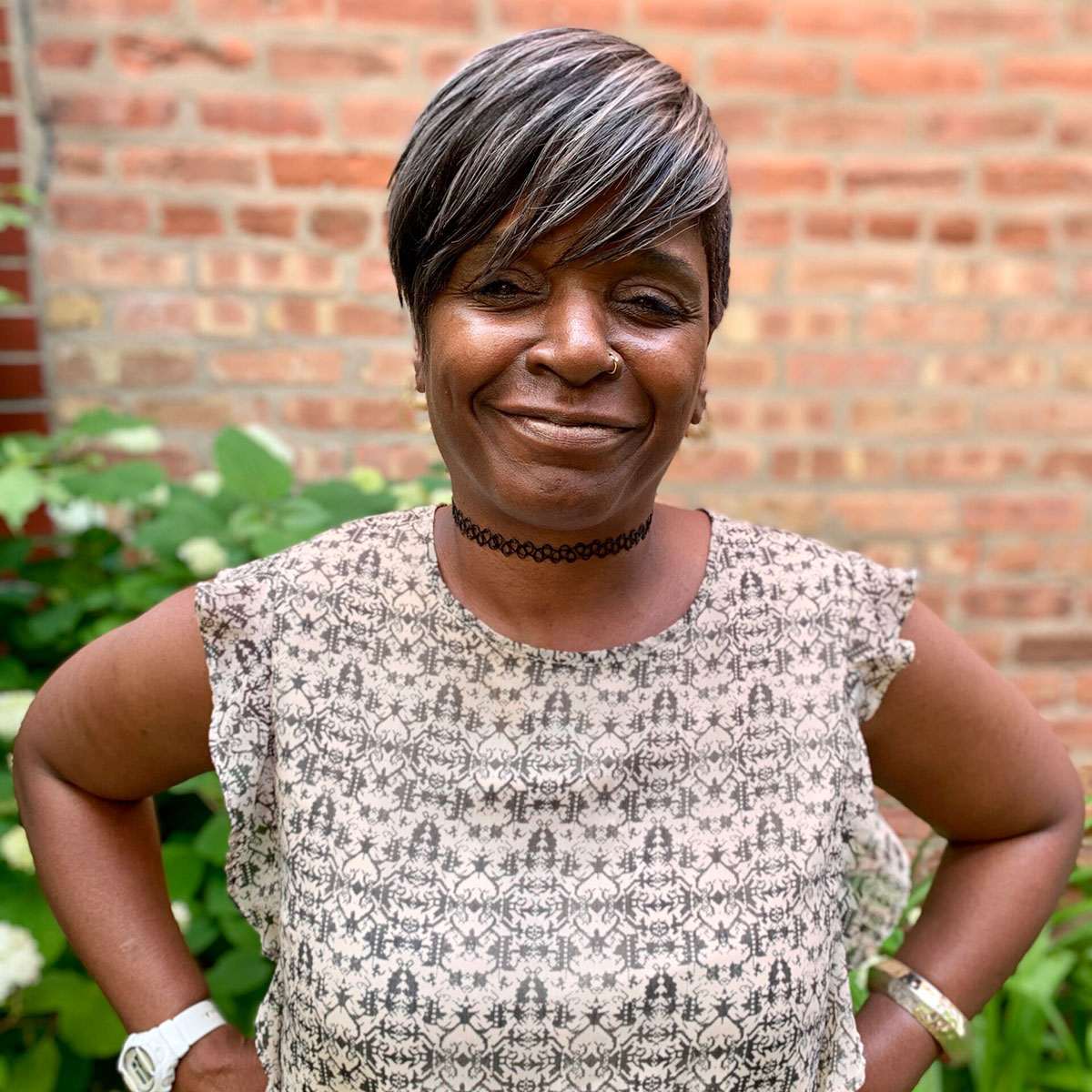Stories of Impact
Lilly
Grace House Resident

Lillian was raised on the west side of Chicago by two working class parents from the south who came north to Chicago for better opportunities. Lilly’s dad was a veteran who joined the Army at the age of 16 because he refused to pick cotton. Both Lilly’s parents were hard working business owners but were denied education opportunities in the south. Lilly’s parents were not going to let that happen to Lilly and emphasized the value of education and the difference it can make in one’s path.
Lilly’s parents sent her to Catholic school. She was one of the few African Americans not only in her class, but in the school. Lilly could not help but feel out of place in school and experienced racism throughout her life. When Lilly was in her neighborhood she was asked, ‘why are you talking like a white girl?’ She felt like she had to be one person at school and a different person at home. Lilly just wanted to belong, be comfortable in her own skin. The one thing Lilly had going for her was her desire to receive an education.
In seventh grade Lilly was selected to participate in Young Engineers of America, an elite program designed to get the best and brightest in schools to begin to think like engineers. She was in the program from seventh grade through her junior year in high school spending her summers at University of Illinois, Chicago learning and growing academically. When you ask Lilly if she likes math, her eyes light up, “I like the blueprints! Math, I love math!”
Not only is Lilly smart, she’s an athlete. She was the first African American swimmer on the Saint Josephine High school swim team, taught swimming lessons for 13 years and was a beach lifeguard in Chicago. Yet, with all these talents, skills and gifts, Lilly never felt like she belonged.
Being one of the few African Americans in school she always stood out. In high school, there were some swim meets Lilly was not allowed to compete in because of her skin color and hair texture. People simple didn’t want her in their pool because of the way she looked. It was, of course very hard for Lilly, and it added to sense of not belonging. When ask about those experiences Lilly shares with a smile, “its okay. I was allowed to swim the next year. I got all the medals and trophies!”
When Lilly graduated from high school she still struggled with her identity, felt like an outcast and as she said, “I wanted to fit in, in all the wrong places.” With the structure of school and athletics out of her life, the wrong places were easy to find. Using marijuana to sooth the pain of estrangement, she began to hang around people using and selling much harder drugs. It wasn’t long before she was using and selling too.
Lilly began a series of being in and out of incarcerations and mandated drug treatment programs. She would return home and to her old neighborhood “clean, but not sober.” She would quickly fall into old patterns, begin to use again and keep the cycle going. Lilly was staying with her daughter and was feeling the effects of withdrawal, looking sick and in pain, her daughter tried to help; she got her the drug she was withdrawing from to help her feel better. “I realized I put her totally at risk with my garbage.”
Lilly has had more than one overdose in her life. Her most recent was over a year ago and she was found on the street by her granddaughter, heart stopped, dead. Thankfully, Lilly was quickly treated with 6 doses of Narcan and recovered. As Lilly said, “It was the worst time of my life, if you can call that living.”
Lilly didn’t want to just get clean anymore, she wanted to get sober. This is Lilly’s second time at Saint Leonard’s Grace House for women. Her first time here was mandated by a judge and Lilly was not ready; this time she’s more than ready! Lilly arrived at a drug treatment facility that also provides mental health support. Finally addressing her mental health issues, Lilly was ready to return to Saint Leonard’s Grace House and has embraced Saint Leonard’s programming with diligence and enthusiasm. When asked what programs Lilly is participating in, she response with a laugh, “all of them!”
As Lilly said, “I’m sober now, not just clean.” To Lilly and so many other Saint Leonard’s residents, sober is beginning to understand demons, patterns and challenging old ways of thinking. It is also a place where there is more than a sense of hope, it’s a sense of belonging. When asked if she feels like she belongs now Lilly’s response is, “I do, I finally feel comfortable in my own skin.”
Lilly has not only become a Saint Leonard’s success story, she’s become a part of the fabric of Saint Leonard’s. Lilly is also mentoring women as they come into the program. Giving back what Lilly has received is rewarding and inspiring. Lilly knows she needs to keep working every day to move her life forward. One of her tools to success is reading. When ask what she likes to read, Lilly’s response is, “I like reading books on cognitive behavioral therapy, it helps me with my thinking.”
Where does Lilly see herself in a year? Lilly is currently working part-time as a housekeeper for a hotel and has a handful of clients she does house cleaning for. To Lilly, being trusted to go into someone’s home is very significant, “there was a time when I couldn’t be trusted, it feels really good now!” She’s looking to start her own cleaning business. Lilly also recently decided to take an organic chemistry course and passed it with flying colors. Lilly wanted to understand the chemicals she and her staff will be working with when she starts her business next year.
Lilly is just one of the many successful faces of Saint Leonard’s.
